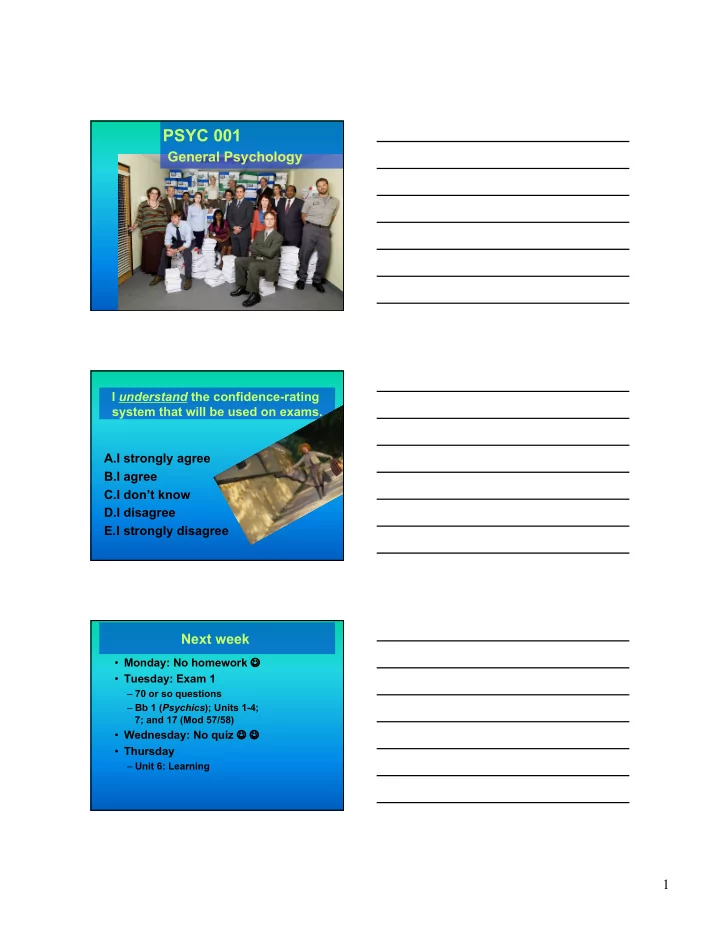

PSYC 001 General Psychology I understand the confidence-rating system that will be used on exams. A. I strongly agree B. I agree C. I don’t know D. I disagree E. I strongly disagree Next week • Monday: No homework J J • Tuesday: Exam 1 – 70 or so questions – Bb 1 ( Psychics ); Units 1-4; 7; and 17 (Mod 57/58) • Wednesday: No quiz J J J J • Thursday – Unit 6: Learning 1
Exam 1 Study Plan 1. Decide what you want to learn (and why) 2. Make an explicit plan: what, where, when (vary location). NO MARATHONS. Think training , not “working on.” 3. Transform content into tools 1. Flash cards 2. Open-ended questions 3. “Draw a … ” exercises 4. AVOID RE-READING, most of the time Exam 1 Study Plan 5. Avoid “the groove” (or fluency ) – Interleave topics within psychology – Interleave psychology with other subjects 6. Do not confuse interleaving with multi-tasking 7. Think VERY hard about using a computer (unless it contains tools): when in doubt, don’t. 2
Social Inhibition Social inhibition : Performance is disturbed Social Facilitation Social facilitation : performance is enhanced I understand the confidence-rating system that will be used on exams. A. I strongly agree B. I agree C. I don’t know D. I disagree E. I strongly disagree 3
Confidence Rating on PSYC 001 Exams: "A" or nothing Percent of the question’s points … Letter Rating If correct If incorrect I’m really unsure, and probably A 100% 0 guessing I think I am right ( this is the 100% 0 default ) Big Dog Alien Abduction Heart Rate (HR) Skin Conductance (SCR) Left-Lateral Frontalis (LF) EMG 4
Alien Abduction Sleep Paralysis § Dissociation § Absorption § Magical Ideation “The script-driven imagery protocol reflects the emotional significance of a memory, not necessarily its veracity.” McNally et al., 2004 Learning? Memory? Cognition? What do psychologists mean by the term, learning , and how is it different from memory ? What’s cognition got to do with it? Term Definition Learning the relatively permanent change in knowledge or behavior that is the result of experience Memory the ability to store and retrieve information over time Cognition the processes of acquiring and using knowledge Comparing Conditioning • Classical : • Operant : 5
Pavlovian Analysis of Salivation Unconditioned Salivation = UCR Food = UCS Conditioned Salivation = CR = CS Footsteps Classical Conditioning Unconditioned Unconditioned Stimulus Response Conditioned Conditioned Stimulus Response There is no "unlearning" (Fig. 7.4) 6
Little Albert Define, distinguish Generalization the tendency to respond to stimuli that resemble the original conditioned stimulus Discrimination the tendency to respond differently to stimuli that are similar but not identical . Classical Conditioning, Acquisition: Fear Learning Unconditioned Unconditioned Stimulus Response Loud Noise Fear Conditioned Conditioned Stimulus Response Rat, Rabbit, or Fear Any Furry Object 7
Little Albert Most Common Fears & % of People Reporting them • 22% Bugs, Mice, Snakes, Rats • 18% heights • 12% water • 11% public transportation (e.g., flying) • 9% storms • 8% closed places • 8% speaking in public • 7% tunnels or bridges (40% of people with fears meet criteria for phobia) Classical Conditioning SELLING Unconditioned Unconditioned Stimulus Response Conditioned Conditioned Stimulus Response 8
Recommend
More recommend